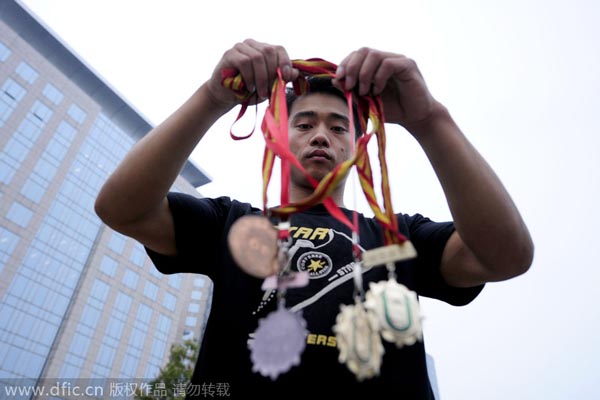 |
|
Former Chinese gymnastics world champion Zhang Shangwu shows his medals on the street in Beijing, 15 July 2011. Zhang, a gold-medal winner at the 2001 Beijing Universiade, retired because of injuries and later started busking in Beijing. [Photo/IC]
|
After worshipping gold medals for decades, China has finally taken a step to separate sports from utilitarianism and accord priority to sportsmanship. A General Administration of Sports notice posted on the website of the Central Commission for Discipline Inspection of the Communist Party of China, the top discipline body, on Monday said medal winners at the Olympics and Asian Games will no longer be listed for contribution awards and there will be no publication of provincial gold medal rankings at national sport events.
The sports administration has also said it would review the harmful effects of the distorted performance outlook based on gold medal worship, and stop focusing on matters that have been belittling the value of sportsmanship.
This is a welcome development, for it signifies that substantial efforts will now be made to restore the respect and glory of sports and athletes, which they so rightly deserve. The administration's announcement came only days after the top anti-corruption watchdog said the crackdown on corrupt sports officials was one of the reasons for the good performance of the Chinese men's soccer team in the 2015 AFC Asian Cup in Australia. For the uninitiated, the Chinese men's team reached the quarterfinals of the Asian Cup, registering its best performance in 11 years.
The gold medal obsession of sports officials did earn China a huge number of medals at the Olympics and other world sports events, but it didn't help develop a sports culture in the country. True, the large number of gold medals Chinese athletes won at international meets boosted Chinese people's national pride. But still, their gilt-edged performances have been widely attributed to the mobilization of the "entire nation's resources".


 Stars of Lijiang River: Elderly brothers with white beards
Stars of Lijiang River: Elderly brothers with white beards
 Wealthy Chinese children paying money to learn British manners
Wealthy Chinese children paying money to learn British manners
 Military-style wedding: Fighter jets, grooms in dashing uniforms
Military-style wedding: Fighter jets, grooms in dashing uniforms
 Striking photos around the world: May 16 - May 22
Striking photos around the world: May 16 - May 22
 Robots help elderly in nursing home in east China
Robots help elderly in nursing home in east China
 Hanging in the air: Chongqing holds rescue drill
Hanging in the air: Chongqing holds rescue drill
 2.1-ton tofu finishes in two hours in central China
2.1-ton tofu finishes in two hours in central China
 Six things you may not know about Grain Buds
Six things you may not know about Grain Buds














